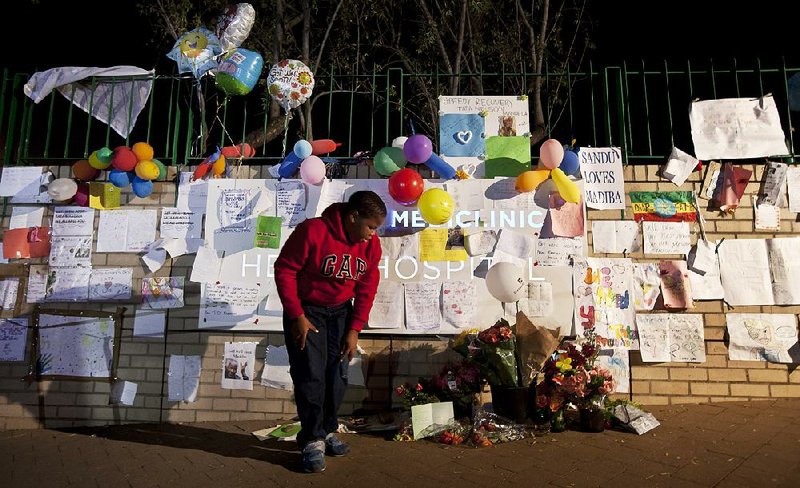JOHANNESBURG - South African President Jacob Zuma said Monday that Nelson Mandela remained in critical condition for a second day in a hospital in Pretoria where he is being treated for a lung infection.
“Doctors are doing everything possible to ensure his well-being and comfort,” Zuma said at a news conference in Johannesburg, but he gave few details about the condition of Mandela, who was hospitalized June 8.
Zuma spoke as South Africans and admirers around the world awaited word on the condition of Mandela, who played a leading role in his country’s transition from white-minority rule under the system of apartheid to multiracial democracy in 1994.
Zuma said he and Cyril Ramaphosa, the deputy president of the governing African National Congress, visited Mandela on Sunday night.
“Given the hour, he was already asleep. We were there, looked at him, saw him, and then we had a bit of a discussion with the doctors and his wife,” Zuma said. “I don’t think I’m in a position to give further details. I’m not a doctor.”
Doctors told Zuma on Sunday evening that Mandela’s health “had become critical over the past 24 hours,” according to an earlier statement from the presidency.
The South African government faced criticism over the weekend after it confirmed reports that the military ambulance carrying Mandela to the hospital had broken down, leaving him waiting on the roadside until a replacement vehicle arrived.
Zuma said he had been assured by doctors that “all care” had been taken to ensure that Mandela’s condition was not compromised during that time. Media reports that Mandela had suffered cardiac arrest on that same night contained “no truth,” he added.
“There were seven doctors in the convoy who were in full control of the situation throughout the period,” he said. “He had expert medical care.”
Mac Maharaj, Zuma’s spokesman, denied reports by CBS News that Mandela waited 40 minutes for a replacement ambulance.
“Not correct. Full stop,” he said, but he declined to say how long the former president was kept waiting.
Maharaj criticized some media coverage, reflecting the growing tension between news organizations’ appetite for details and updates about Mandela’s health and the government’s desire to control information about the revered national figure.
The government’s priority, Maharaj said, was to “protect the privacy of the patient and the family” and to “uphold the dignity of the patient.”
On Monday, well-wishers streamed to the gates of Mandela’s hospital, taking flowers, cards and posters. Many were schoolchildren on annual winter vacation.
Chris Wakube, 17, brought a card for Mandela, saying he had been urged to visit by his mother.
“We are in the midst of history, and I want to be there, to be part of what will happen to our grandfather,” he said. “He has done everything for us.”
The part of Pretoria where the hospital is located is home to many migrants from other African countries, some of whom also visited the hospital. Among them was Jean-Crispin Maboshi, a clothes-trader from the Democratic Republic of Congo.
“This is more a moment of reflection than of sadness,” he said. “Other African leaders especially need to take lessons from Mandela. But although they say how sad they are, they don’t seem to be adopting his ways.”
News of Mandela’s deterioration came as President Barack Obama prepared to leave Wednesday for a short tour of Africa, including a visit to South Africa starting Friday. Obama had planned to visit Mandela. U.S. officials now say that such a meeting would depend on Mandela’s health and his family’s wishes.
Zuma said Monday that the state of Mandela’s health would not affect the trip.
“I don’t think you stop a visit because someone is sick,” Zuma said.
Information for this article was contributed by Alan Cowell and Mukelwa Hlatshwayo of The New York Times.
Front Section, Pages 4 on 06/25/2013

